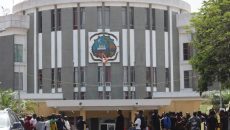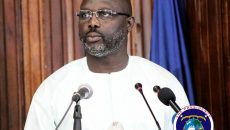HARPER, Maryland – The Catholic Bishop Conference, which comprises of bishops of the Catholic Church, has called on the government to lead the process of a national dialogue for the possible establishment of a war and economic crimes court and full implementation of the Truth and Reconciliation Commission’s recommendations.
The bishops expressed their position in a communique issued on Sunday, May 5 at the end of a weeklong plenary assembly held in Harper, Maryland.
“We, the Catholic bishops of Liberia, have held our plenary assembly 2019 in the Catholic Diocese of Cape Palmas, under the theme ‘Reconciliation.’ The choice of our theme was necessitated by the trending polarized realities, both within the church and the state,†the communique read.
“Moreover, reconciliation is an integral part of the church’s mission.â€
The bishops continued: “Thus, in our attempt to reconcile the country after many years of conflicts, the Truth and Reconciliation Commission was set up. Again, while the work is done and achievements made, we can also say that more efforts have to be made. Among these is the issue of accountability.â€
They warned that reconciliation cannot be achieved without accountability. According to them, the culture of impunity is not only in opposition to reconciliation, but it is also detrimental to democracy and must never be encouraged. They joined many other citizens calling for the establishment of a special court to try war and economic criminals to call on the government to lead a national dialogue on the recommendations.
“For some time now, a good number of our citizens have been advocating for the establishment of war and economic crimes tribunal and other recommendations as contained in the report of the Truth and Reconciliation Commission. We the Catholic Bishops of Liberia emphatically propose a national dialogue of all stakeholders on the possible establishment of war and economic crimes tribunal and other recommendations as contained in the report of the Truth and Reconciliation Commission,†the statement added.
“We call on the government of Liberia to lead this process. And, we, bishops do commit to work with the government and all stakeholders.â€
The bishops also hope that the outcome of the national dialogue will reconcile citizens.
Rev. Fr. Dennis Cephas, secretary of the conference, disclosed in an interview that the decision was in line with the statute of the Catholic Church.
Cephas said while the church does not pretend to be an expert on reconciliation, preaching and living reconciliation is part of its mandate. He said the proposal for reconciliation in Liberia is not necessarily meant to gloss over the country’s immediate past history or embark on witch-hunting.
“We can agree to disagree in a civil manner. This is what reconciliation is all about. But, the idea of reconciliation is not an easy task,†he said.
The clerics further appealed for the government to embrace dialogue on issues that affects the country and its citizens.
“Dialogue, not confrontation is the way forward. Dialogue is not a sign of weakness, but that of true leadership,†they noted.
The communique encouraged the government also to find a remedy to the appalling economic situation of the country. It also encouraged citizens, members of the opposition, and the media to embrace the spirit of reconciliation by being responsible partners to the promotion of peace and democracy.
Featured photo by Franklin Nehyalor



